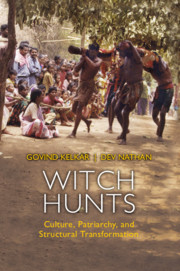9 - Witch Hunts in Development: Policy and Practice
Published online by Cambridge University Press: 12 May 2020
Summary
In this chapter we look in more detail at the manner in which witch accusations were linked with the development policy of capitalist systems in some countries. Witch hunting could be governmental development or judicial policy. Some of them were market-based developments in rural areas. Others were new forms of witch accusations that appeared with urbanization, while new metaphors were developed for large-scale capitalist enterprises in mines and plantations. The geographic areas covered are countries in Africa, the Americas, and the Pacific.
Witch hunts in anti-colonial uprisings in Africa
European colonial states in Africa generally made illegal the persecution of alleged witches. The laws did not make beliefs in witchcraft illegal but made actions based on those beliefs illegal (Redding 2019: 5–6). Colonial states were then seen as the protectors of witches. In opposition to this, during some anti-colonial movements, ‘cleansing’ of the concerned African societies from witchcraft practices was part of these movements. The 1904–6 Maji Maji uprising in Tanzania included witch hunts (Larson 2014 and Redding 2019). In Kenya, faced with the challenge of movements based on ‘spiritual oaths’, the colonial state too utilized the witchcraft complex, recruiting witch finders in Kenya to find those who had taken the Mau Mau oath (Luongo 2006). We have not gone into the pre-colonial witch history in South Africa, as in the Zulu kingdom, where there was a classic orientalist creation of a non-existent witch massacre (Pels 1998). Nevertheless, the contemporary history of witch hunts in South Africa does make it predominantly a matter of women as supposed witches, a history that could well go back into the pre-colonial period.
The end of colonialism from the 1950s provided an opportunity for some of the newly independent African states to take up anti-witchcraft programmes. Cyprian Fisiy and Peter Geschiere report a Cameroonian friend saying,
But with decolonization all this is going to change. You white people think witchcraft does not exist. But now Africans hold the positions of authority and they know witchcraft is all too real here. Soon the law will be changed, so that judges will be able to deal with witches. (1990: 136)
Not all African countries have changed the colonial laws, which make anti-witch actions a crime. South Africa, for instance, still has the colonial era law.
- Type
- Chapter
- Information
- Witch HuntsCulture, Patriarchy and Structural Transformation, pp. 169 - 188Publisher: Cambridge University PressPrint publication year: 2020

